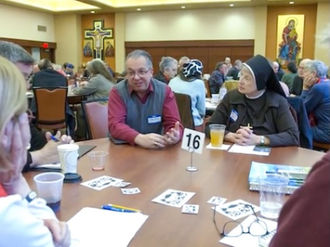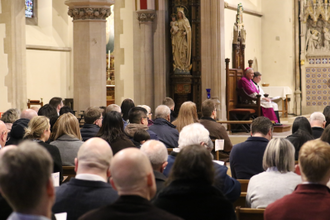USA: Appalachian Catholics and labour align to tackle environmental issues

Image: Pinnace Productions
Source: Catholic Committee of Appalachia and In Solidarity
Pittsburgh, Pennsylvania: On Saturday, Catholic leaders from across Appalachia looked to words written half a century ago to consider how the Church should tackle the current exploitation of the environment and workers. Three bishops convened 150 Catholic and labour leaders at the Diocese of Pittsburgh to look to the future as well as mark the 50th anniversary of the Appalachian bishops' pastoral letter This Land is Home to Me and the 10th anniversary of Pope Francis' environmental encyclical Laudato Si.
Bishop Mark Brennan of the Diocese of Wheeling-Charleston in West Virginia, recalled the strong words of This Land is Home to Me as he delivered his own, hard-hitting messages.
He denounced the "powerful corporations" that abuse both workers and the earth as they "put human beings below the profit of the few."
Angela Ferritto, President of both the Pennsylvania AFL-CIO and Union Energy (which advocates for clean energy jobs) recalled how labor and the Church have walked side by side for generations. She imagined a future standing strongly together. "When we lift each other up, when we protect our planet and our livelihoods, we honour both our faith and our solidarity."
The delegates to the dialogue also included grassroots members of the Catholic Committee of Appalachia, priests and deacons, sisters, and diocesan staff. They shared and heard stories about corporations forcing their will on the people and the environment.
Sister Helen Skormisley described how her congregation-the Sisters of St Joseph in Wheeling, West Virginia-refused overtures from fracking companies for decades. However, a 2022 law enabled a company to frack the nuns' land against their will. She worried for the health of her congregation and her neighbours, citing studies that show increases in cancer, heart disease, and birth defects for fracked communities. Sister Skormisley also drew a parallel to mining. "I'm the daughter, granddaughter, and sister of miners. Mining put food on the table and that's pretty easy to understand. All the health consequences were not." She recounted watching two family members fight Black Lung and said of fracking, "We can't allow them to poison our water." She reported her congregation will use the fracking company's payments to advocate for accountability, protect the community's health and the environment. She closed by reminding the group that hope is an action. "I am holding on to that hope like a saint holds onto a prayer because this land is-and always will be-home to me."
The event discussed daunting issues but returned, again and again, to hope, living into the event title: A Healthy Future for This Land. "We have the resources to have a safe environment. There's no reason why we can't develop better methods to keep our air clean and our water clean," said Bishop Mark Eckman, the Bishop of the Diocese of Pittsburgh who was installed in July of this year. His predecessor, Bishop David Zubik, also served as a convener for the event. Bishop Zubik suggested that we can find a way to do both-"lift up and care for creation and care for the workers in Appalachia."
Bishop Brennan gave some of the most direct and ambitious pleas during the all-day event. He dreamed of solidarity among workers across the world, fostered with the assistance of unions. He repeatedly cited Saint Pope John Paul II, including his statement that "unions are a mouthpiece for social justice" from his 1981 encyclical Laborem Exercens. And Bishop Brennan rallied the delegates even more boldly when he stated, "We need to raise our voices and start boycotts" against companies abusing workers.
One delegate who is both a longtime Catholic and longtime union organizer, Paul Lemmon, remarked that faith has the ability to bring "true moral high ground" to the issues plaguing us. A former coal miner from Western Pennsylvania, he reported that religious sisters and others spoke about the issue of cleaning up abandoned wells as something that could unite faith and labor. In Pennsylvania alone, there are an estimated three hundred thousand abandoned gas and oil wells polluting the water and air, and yet little is being done. "It's obvious to everyone that we should clean up these wells that are poisoning us. That's where the faith community could be a game changer - by helping us reach into our hearts to do the right thing for our children and for God's creation." Mr Lemmon currently serves as the policy director for Union Energy through which he has been working with faith institutions and labor to raise awareness on these issues.
Delegates to the event were either sponsored by dioceses or selected by members of the planning committee. A core part of the event was reflecting on personal experiences in a process known as synodal dialogue, ushered in by Pope Francis. The main organizers supporting the bishops in convening the event were the grassroots group
Catholic Committee of Appalachia and In Solidarity, is a Catholic communications nonprofit based in Washington, DC.
Lonnie Ellis, OFS is Executive Director of In Solidarity
LINKS
Catholic Committee of Appalachia: www.ccappal.org/


















